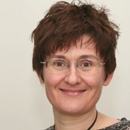Advisory Board and Editors Neuroscience

Maria A. Deli
Scientific advisor at the Institute of Biophysics, Biological Research Centre of the Hungarian Academy of Sciences in Szeged, Hungary. Head of the Biological Barriers Research Group. Honorary professor at the University of Szeged.

Gopikrishna Deshpande
Prof. Gopikrishna Deshpande is a Professor of Electrical and Computer Engineering at Auburn University. He obtained his Ph.D. in Medical Imaging from Georgia Institute of Technology and his M.S. in Electrical and Computer Engineering from the Indian Institute of Science.
Prof. Deshpande's research interests and expertise include neuroimaging, functional magnetic resonance imaging (fMRI), brain connectivity, signal/image processing and machine learning.

Valerie C Doyere
CNRS Director of Research. PhD in Neuroscience, University of Paris 6 (France). CNRS tenured researcher since 1993. HDR in 2007. Team leader since 2010. Head of Cognitive & Network Neuroscience Department of Paris-Saclay Institute of Neuroscience (France). Associate editor or review editor for several on-line access journals.

Robert Druzinsky
I am an evolutionary biologist and functional morphologist with diverse interests. My major focus is on the evolution of the masticatory apparatus of mammals, particularly rodents. I am also working on an anatomy ontology for muscles of the head and neck in tetrapods. I also study the biomechanics of teeth, as well as the neurophysiology of mastication.

Ana I. Duarte
Post-Doc Fellow at Center for Neuroscience and Cell Biology (since 2007), Coimbra, Portugal. Visiting researcher at Neuronal Survival Unit, Wallenberg Neuroscience Center, Lund Medical School, Lund, Sweden (Sept 2008 - May 2009). PhD and MSc in Biology (Cell Biology) by University of Coimbra, Portugal (in 2007 and 2002, respectively). Degree in Biology by University of Coimbra, Portugal (in 1998).

Hedley Emsley
Expertise in neurology, cerebrovascular disease, and the neurovascular-neurodegenerative interface, including the role of inflammation/infection, novel imaging measures, emerging therapeutic targets and clinical trials.
Career History:
Completed medical degree, including intercalated BSc in Pharmacology, University of Manchester (1996). House Officer and Senior House Officer posts in North West England and National Hospital for Neurology and Neurosurgery. Completed MRCP(UK) (1999), then undertook a three year clinical research post in Manchester leading to a PhD (2004). Completed neurology training, Walton Centre for Neurology and Neurosurgery then obtained CCT in Neurology (2008), as part of a Clinical Lecturer post, University of Liverpool. Appointed ConsuItant Neurologist with specialist interest in stroke neurology for Lancashire Teaching Hospitals NHS (2008-present). Also contributes to Lancashire and Cumbria Stroke Network developments. Honorary Lecturer for University of Liverpool. Member both the Association of British Neurologists and British Association of Stroke Physicians (BASP). Elected to the BASP Training and Education Committee in 2009, and appointed Chair of the committee (2010-present).

Luciano Fadiga
M.D., Ph.D. He has a deep knowledge of and experience in electrophysiology in monkeys (single neurons recordings) and humans (transcranial magnetic stimulation, study of spinal excitability and brain imaging). His current research include the study of the relationships between action and language and the realization of brain-computer interfaces specifically designed for human use.

Giovanni Federico
Giovanni is a Cognitive Neuroscientist. He works as a tenure-track Assistant Professor of Cognitive Neuroscience at Suor Orsola Benincasa University in Naples, Italy. Giovanni holds a PhD in Experimental Psychology and Cognitive Neuroscience. His research areas include Cognitive Neuroscience, Experimental Psychology, and Neuropsychology.

Stefano Ferraina
Professor of Human Physiology, I'm a systems neuroscientist and neurologist by training. My current researches include the study of the cognitive aspects of motor control and the neural correlates of hierarchical learning in human and non-human primates. I'm also interested to multidimensional signal analysis and to the progress of neurotechnologies for developing innovative brain-computer interfaces.

Marco Filardi
Marco Filardi, Ph.D., is a Senior Assistant Professor of Experimental Psychology in the Department of Italian Language, Literature, and Arts in the World at the University for Foreigners of Perugia (Italy)
His research interests involve sleep and circadian rhythms in clinical (e.g., primary sleep disorders, neurodegenerative disorders, psychiatric disorders, and neurodevelopmental disorders), and non-clinical populations (e.g., children, adolescents, and elderly), sleep methodology (e.g., multisignal wearables, actigraphy, non-linear movement analysis, PSG, signal processing), neuroimaging correlates of sleep disturbances and cognitive deficits in sleep disorders and neurodegenerative conditions.

Carla Fiorentini
CARLA FIORENTINI is presently Director of Preclinical Research at the Association for Research of Integrative Oncology Therapies (ARTOI). She was Director of “Natural Substances, Traditional Medicine” Section at the Dept. of Therapeutic Research and Medicines Evaluation, and Coordinator of a Research Group at the Italian Center for Global Health, Istituto Superiore di Sanità (ISS), Roma. Academic Degree in Biology and Specialty in Microbiology, University of Roma. Post-doctoral training at Karolinska Institutet, Stockholm, Sweden. Her current research is focused on unravelling the role of bacterial protein toxins in cancer and on the use the bacterial toxin CNF1 as a potential novel therapeutic for central nervous system disorders. She is co-inventor in five different patents on CNF1 activity on the central nervous system. As co-author of numerous book chapters and articles in leading journals, she is renowned in the field of bacterial protein toxins.

Eleonora Fiorenzato
Dr. Eleonora Fiorenzato is a postdoctoral research fellow at the Department of Neuroscience, University of Padova, Italy. Her research aims at investigating the interplay between cognitive as well as behavioral disorders in Parkinson’s disease, with a particular interest to the brain imaging changes associated with these deficits.
Dr. Fiorenzato's main scientific interest is to identify biomarkers of cognitive decline in neurodegenerative disorders (such as, Parkinson’s disease) by combining clinical, cognitive and neuroimaging data (i.e., structural MRI, resting-state fMRI, PET) to identify different trajectories of disease progression.

